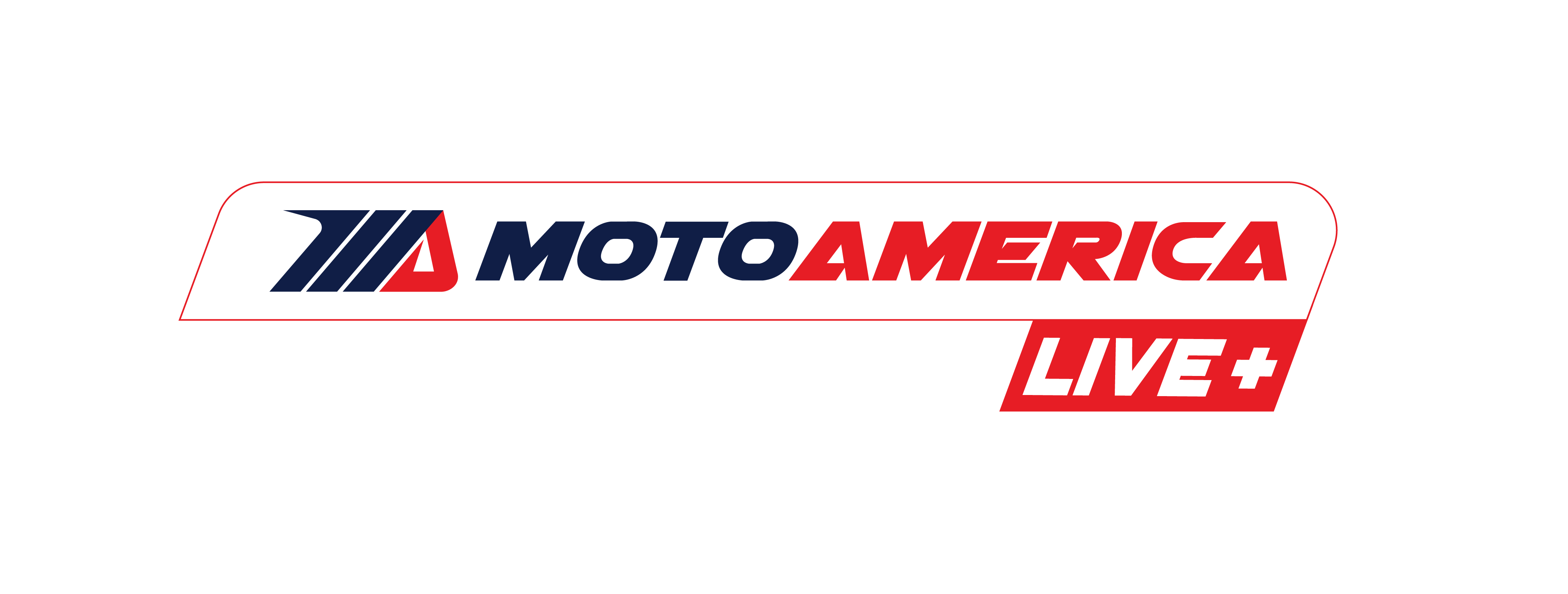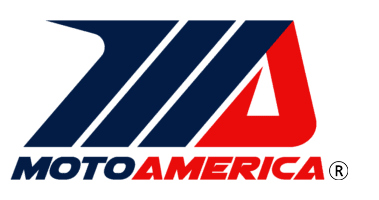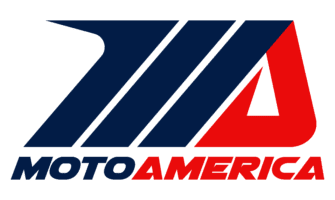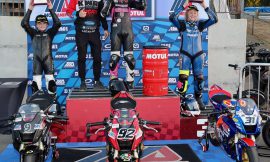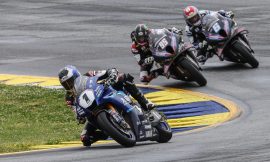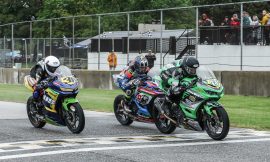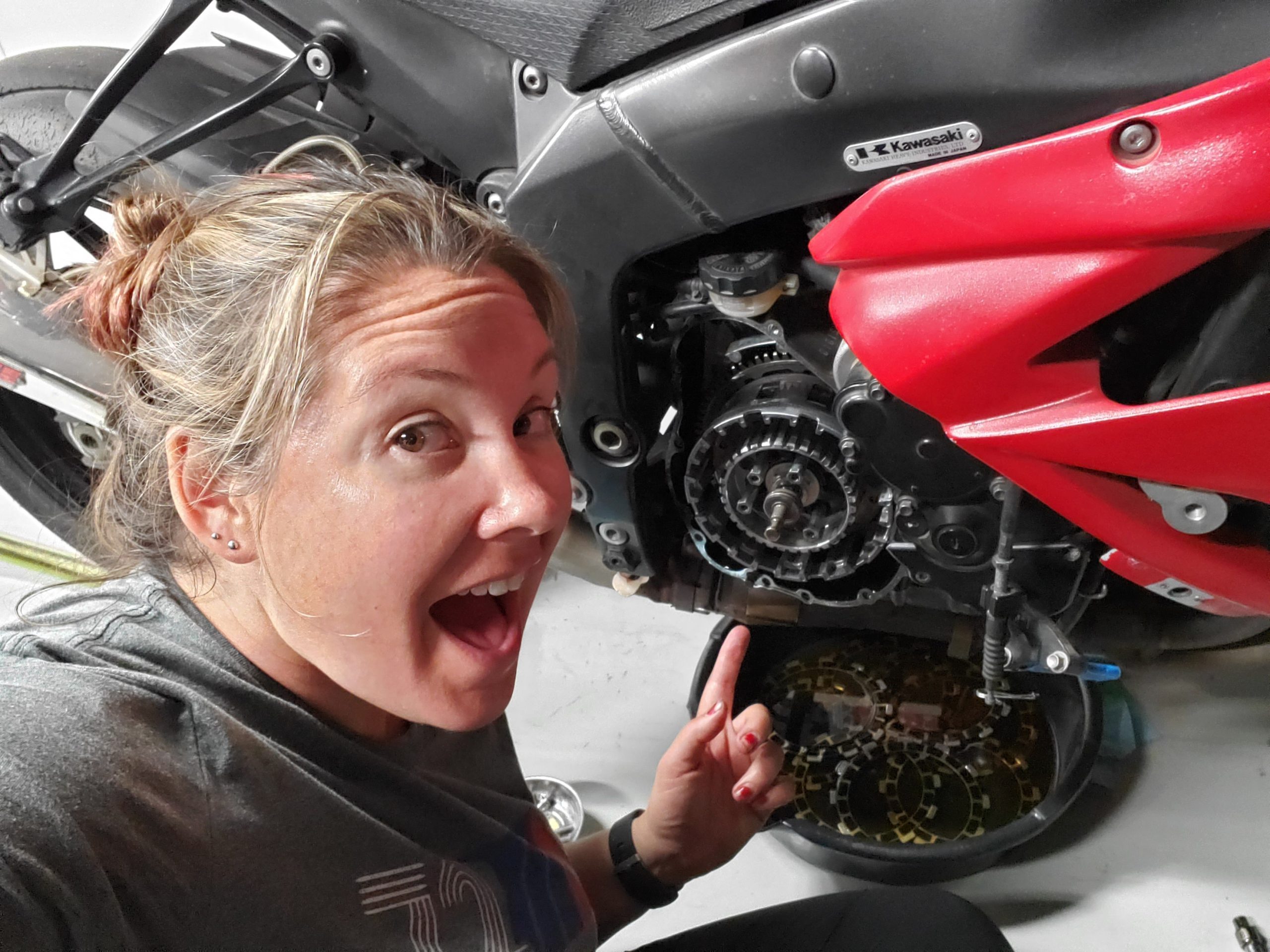
MotoAmerica Technical Steward Jen Bauer will make you laugh until you cry. And she’ll also yell at you if you get out of line. Hey, it’s her job. If she yells at you for almost not going into Parc Ferme, that’s to prevent you from being disqualified. If she yells at you for doing something stupid, it’s to prevent you from hurting yourself or someone else. She also yells because motorcycles are loud and she’s wearing a headset with someone else probably yelling at her. So, if she happens to yell at you, remember she’s doing it for all the right reasons. It’s a yell of endearment.
What was your introduction to the motorcycle world?
Growing up in Wisconsin, my aunt and uncle had Harleys, but I wasn’t allowed to ride on them, so I don’t think that counts.
I went to college for Mechanical Engineering at the University of Wisconsin – Madison. I joined the SAE Mini Baja student group to get some hands-on experience designing and building a small off-road vehicle. For a few years, I was the only girl on the team. All of the guys had some sort of scooter or motorcycle. I started dating a guy who had a Suzuki TL1000 and riding on the back of that bike was soooooo uncomfortable. One day we were coming back to my house from a ride and my neighbors were having a party in their front yard. I was expecting us to slow down and pull into my driveway, but my boyfriend decided it would be a good idea to show off and pull a wheelie. I nearly fell off the back of the bike. We had a huge fight, which ended with him yelling, “Any girlfriend of mine will ride on the back of my motorcycle!” and I yelled, “Screw you, I’m getting my own!” Several weeks later, I took the MSF class at the local technical college and told everyone I was never going to ride on the back again. That was in 1999.
My first motorcycle was a 1972 Honda CL450 Scrambler. Everyone called it “The Stinkmaster” because it vaguely smelled like diesel. I bought it for $50 from one of the guys on the Mini Baja Team. I always had to work on it for about a half hour before I could ride it. It was 27 years old, carbureted, two cylinders, with drum brakes, a kick-starter for when the battery was dead, and a slightly peeling gas tank that someone had hand-painted grey flames on. I learned a lot about riding and working on motorcycles from that bike.
Every summer while I was in college, I would tag along on various weekend motorcycle camping trips to Wisconsin’s many state parks. Every year we would kick off the summer by camping at Road America for the AMA motorcycle races. And that was my introduction to motorcycle racing.
What led to you working in the MotoAmerica paddock?
I knew James Morse, the first MotoAmerica Technical Director, from working for him at TrackXperience Track Days in Southern California. I teach the New Track Rider School for TrackXperience.
At an all-female track day (Femewalla) in California in December 2016, I won the raffle grand prize of a free Yamaha Champions Riding School (YCRS). The school included a rental Yamaha R6. Since I didn’t have to transport my bike to the school, I decided to attend YCRS across the country at New Jersey Motorsports Park. It turned out that the YCRS was the week after a MotoAmerica round at that track. I figured I’d fly in early, check out the races, and hang out with James and some of the So Cal racers. When I started looking into how to get tickets, I found the website for soliciting volunteers. So, I volunteered to help with Technical Control because I was too cheap to buy tickets. Sheila Paul had me check tire stickers on hot pit, and I got the section with all the factory teams. I was fascinated with the teams and star struck by all the racers so I continued to volunteer for as many races as I could make it to over the next two years. Eventually, the Technical Control Staff had an open position and James asked me if I’d be interested in helping. I started working for MotoAmerica during the 2019 season in Technical Control. Since then, I’ve become FIM certified as both a Technical Steward and Clerk of the Course.
What part of the job do you enjoy the most?
I get very excited about the bikes. I love mechanical things. I love how our series is helping develop the next generation of Supersport for the world platform. It’s very interesting to see all the effort that goes into balancing and how each angle of each manufacturer’s specific technologies has to be considered. There’s so much more that goes into it than just adding weight to the motorcycles.
I also am always a little star struck at the beginning of each weekend when I get to inspect a clean, really well-made Superbike. The level of effort that goes into that machinery and to making the entire crew work well together is so incredible. I really appreciate the craftsmanship and attention to detail form the premier teams.
I’m excited how the Baggers and Twins classes are also really stepping up the machinery they are bringing to competition. The Aprilia 660s and (Yamaha) R7s and (Suzuki) 8Rs are a huge improvement from the days of clapped out SV650s and leaky chop-shop MT-07s. And I think the exciting racing from the MotoAmerica Twins Cup really influenced manufacturers to enter or step up their game. I’m appreciative to the early teams who worked hard to participate and bring us that exposure (now please keep your unreliable leaky pile of parts at home…)
Also, I really like everyone I work with in tech. We are a very good team with a lot of experience and really play off each other’s strengths. I especially like working with Patrick Metzger, he’s really hot (LOL we’ve been dating for over seven years.)
What part of the job is the most difficult?
When someone doesn’t follow the rules and we have to DQ them. It’s so disheartening to see such a huge level of effort from the racers and team members get eliminated by someone’s oversight. It’s a different feeling than when you call someone out for blatantly cheating, or you tell them to correct something, and they just don’t.
The other part that’s very nerve-racking is how on-the-spot we need to be with our understanding of both technical and competitive rules. Tech is the first place people go with questions, issues, and when they are mad about something. We get yelled at a lot. If there’s a typo or mistake in any published document, we get yelled at. If a penalty is enforced and someone loses a grid spot, we get yelled at. When racers miss the sighting lap, we have to help re-grid them.
When one race is ending and we’re starting a Parc Ferme, we’re also needed out on the grid to help start races. When crashed bikes come in from the track, we have to do inspection reports. We have to be very heads-up and aware of everything happening because we’re accountable for a lot of the safety and rule enforcement. I’m proud that our team is cross-trained and works very well together, so we can help each other out when we get busy. We all have our jobs, but we all end up doing a little bit of everyone’s jobs when it’s busy.
Finally, for the love of all things holy, I wish people would stop taking pictures and trying to film in Parc Ferme. While the bikes are in impound, no one is allowed to take any data, especially from their own bike. No pictures, no tire pressures, no lap timers, no engine maps, no using tools to adjust something, etc. Please just go back to your pit and de-brief so that we have the space to do our inspections. I nearly had to call security on two separate instances at Daytona because people wanted social media content and it’s just inappropriate.
What do you like to do when you’re not at the racetrack?
I love to do track days on my Suzuki GSX-R1000. Patrick and I have also been doing car track days here and there, as well. We watch all sorts of motorsports racing. Patrick lives in Las Vegas, and I live in Los Angeles so there’s always a lot of planning/coordinating on how we meet up on the weekends. A lot of times, we meet at the track. We also enjoy hiking, working on our bikes and cars, and spoiling his elderly pit bull, Storm.


